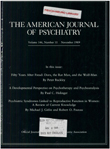Platelet [3H]imipramine binding in affective disorders: trait versus state characteristics
Abstract
Platelet [3H]imipramine binding (Bmax) was determined in 67 patients with major affective illness (33 euthymic bipolar, 34 depressed unipolar) and 58 normal control subjects. Bipolar patients had significantly lower Bmax values than did control subjects. The mean Bmax in the unipolar patients was lower than in the control subjects, but the difference was not statistically significant. Dissociation constant (Kd) values did not distinguish patients in either category from control subjects. The significantly lower Bmax in euthymic bipolar patients and the apparent state independence of Bmax in some but not all unipolar patients suggest that platelet imipramine binding may be a trait marker in a subset of affective disorders.
Access content
To read the fulltext, please use one of the options below to sign in or purchase access.- Personal login
- Institutional Login
- Sign in via OpenAthens
- Register for access
-
Please login/register if you wish to pair your device and check access availability.
Not a subscriber?
PsychiatryOnline subscription options offer access to the DSM-5 library, books, journals, CME, and patient resources. This all-in-one virtual library provides psychiatrists and mental health professionals with key resources for diagnosis, treatment, research, and professional development.
Need more help? PsychiatryOnline Customer Service may be reached by emailing [email protected] or by calling 800-368-5777 (in the U.S.) or 703-907-7322 (outside the U.S.).



